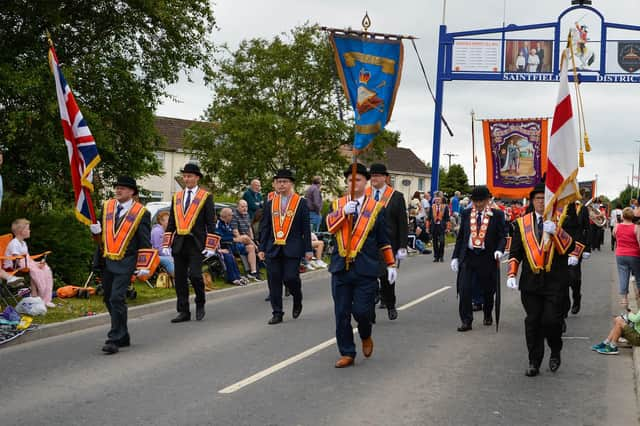John Coulter: The three key messages the Orange Order should deliver in speeches at this year's Twelfth demonstrations


For generations, the loyal orders - and especially the Orange - have played a pivotal role in influencing unionism politically.
There are three key messages I want to hear from Orange platforms this Twelfth. Firstly, that it is unveiling a campaign to mobilise the pro-Union vote because of the apathy witnessed among unionists and loyalists in the Assembly and council elections.
Advertisement
Hide AdAdvertisement
Hide AdSecondly, that the order is stressing its religious roots and encouraging its members, band members and the public to re-engage with the Christian faith as well as encouraging the Christian churches to get voters registered.


And thirdly, that the order will act as a forum for unionist unity by encouraging the parties to work together to maximise the pro-Union vote, especially when it comes to transfers and turnout.
Put bluntly, all the loyal orders, and especially the Orange, needs to relaunch the 1970s United Ulster Unionist Council, or Unionist Coalition – affectionately known as “the Treble-UC” – which represented up to four unionist parties.
But with Northern Ireland facing crumbling health and education sectors as well as a cost of living crisis, the time has come for the Orange to really step up to the mark and provide a constructive example to the unionist family’s political leaderships.
Advertisement
Hide AdAdvertisement
Hide AdThe pro-Union community should not underestimate the importance of the Orange as a catalyst for unionist co-operation.
Although the Orange has openly voiced its opposition to the Northern Ireland Protocol and the Windsor Framework, the summer marching season could be the platform to create a mood within unionism which could see the DUP re-enter a Stormont executive come the autumn.
Okay, folk may point to North Antrim MP Ian Paisley’s hard-hitting “ice age” interview on the BBC Nolan Show as an indicator of a hardening of the DUP’s attitude towards the British government and Westminster political establishment in general.
Then again, as someone who grew up with Paisleyism in North Antrim, and call me cynical, but I strongly suspect that the “ice age” utterance has more to do with who runs the DUP than a clear statement of policy.
Advertisement
Hide AdAdvertisement
Hide AdIronically, just as the DUP found itself as a Westminster power broker when the then Tory prime minister Theresa May needed DUP MPs as part of a “confidence and supply arrangement” to prop up her Conservative government, the DUP could find itself back on the front row of British politics if after the next UK general election, there seems to be a hung parliament and Labour needs DUP votes to prop up Sir Keir Starmer’s administration.
However, the DUP cannot afford to let the people of Northern Ireland hang about politically to await the outcome of any UK general election, especially if a similar election in the Republic throws up a Sinn Fein-led, or even majority rule, republican movement government in Leinster House.
While the loyal orders can maintain their dogmatic stance against the Protocol and Framework, they could also use the platform speeches over the Twelfth - as well as the Royal Black Institution’s August Black Saturday demonstrations - to gently persuade the DUP of the necessity of having Stormont back, even in shadow form.
The loyal orders, especially the Orange, were once the cement which held the many strands of Protestantism, unionism and loyalism together. The upper class businessman and the working class labourer could both sit side by side in the lodge room and call each other “brother”.
Advertisement
Hide AdAdvertisement
Hide AdWhile some may try to dismiss the Orange Order as a movement now for middle-aged folk and pensioners, it should not be forgotten that almost every Orange lodge on parade on 12th July will be accompanied by a musical band.
Indeed, while membership of the loyal orders may have dipped over the past generation, there is a thriving marching band scene, especially among the flute band fraternity. Herein lies the influence of the Orange Order. It can be a forum for influence amongst that fraternity with many of these bands based in loyalist working class areas.
The real danger is that the DUP digs its political heels in so much over the traditional marching season that time runs out for devolution to return and some form of joint authority with Dublin, dressed up as 21st century direct rule, is foisted on Northern Ireland.
The Dublin government got its toe inside Northern Ireland’s door in 1985 with the then Anglo-Irish Agreement, which saw the Maryfield Secretariat established near Belfast.
Advertisement
Hide AdAdvertisement
Hide AdSinn Fein is pushing hard for the British Irish Ministerial Council to be given more powers in the running of Northern Ireland because of the devolution logjam.
Although the DUP held its council representation during last month’s local government poll, if the cost of living crisis bites even harder this year, at some point could the DUP be punished at a future Westminster general election?
Perhaps the solution is for the Stormont executive to be reformed by the DUP, but with limited powers until new legislation can be brought forward at Westminster to safeguard the Union for another generation?
This may be viewed as a sticking plaster solution for a major cost of living crisis, but at least the devolution engine would be ticking over.
Advertisement
Hide AdAdvertisement
Hide AdCome the 12th July, the Orange Order has a wonderful opportunity to turn the key in the devolution ignition.
With tens of thousands of people listening to demonstration speeches that day, the Order cannot afford to waste this golden opportunity to be the power broker of unionist politics.
- Dr John Coulter has been a journalist since 1978, including with this newspaper.
See also: